First, the hypothetical scenarios in the article do not imagine different laws of physics. The "parallel" universes could just as well be serialized resets as Gervais imagines.
Your conclusion that 1+1=2 must be a true fact about the world solely because it's consistently "discovered" is a form of circular reasoning. You're assuming the truth of the conclusion within the premise itself (begging the question).
In any case, the fact that a concept is widely accepted doesn't necessarily make it an objective truth independent of human cognition. For example, the concept of a creator god has also been widely "discovered" throughout history, yet its objective truth is anything but established.
Consider that 1+1=2 is an abstract concept invented by humans. It's a powerful tool for understanding and navigating the world, but it exists within the realm of human thought and language. The same can be said for all scientific concepts and models. They are human constructs designed to describe and predict phenomena, not necessarily reflections of an objective reality that exists independently of us.
Besides, does 1+1 really equal 2? Would you know how to prove that? You might invent some more "fundamental" axioms (e.g. the Peano axioms) to prove it. But then what proves those are true? Gödel's Incompleteness Theorems demonstrate the inherent limitations of formal systems and the impossibility of proving all truths within those systems. So even in mathematics, there are limits to what we can definitively know and prove.
Be wary the danger of assuming a privileged, objective viewpoint when discussing the nature of reality. Science is conducted from within the world, not from an external vantage point. We are inherently part of the system we're trying to understand, and our observations and interpretations are inevitably influenced by our position within it. This doesn't negate the value of scientific inquiry but reminds us to be mindful of its inherent limitations and the role of human subjectivity.
Science is a dynamic and evolving enterprise, shaped by both empirical evidence and the human minds that interpret it. Embracing this complexity will hopefully lead to a richer and more nuanced understanding of the world around us.
